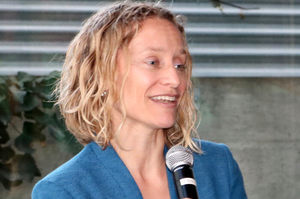
Brittney Nystrom is Executive Director of the American Civil Liberties Union (ACLU) of Utah. Her work focuses on advocacy for civil rights and civil liberties in Utah. She will return to the University of Notre Dame campus in October 2021 to receive the Kroc Institute’s 2021 Distinguished Alumni Award.
Brittney’s career path has wound through many different organizations, but one common thread binding many of her roles together is a focus on “increasing fairness” within national and international systems.
After graduating from the University of Notre Dame with a degree in anthropology and peace studies, Brittney was drawn to direct service work and began a term with AmeriCorps in Madison, Wisconsin. Her work as an employment counselor at a community center exposed her to many of the struggles and injustices inherent in the U.S. criminal justice system.
“This work made me interested in reforming the policies and institutions I was working within,” said Brittney. “I was just getting frustrated with having to tell people over and over again that they weren’t going to get a job or we had limited resources to help them.”
This desire led her to law school at Northwestern University, and then on to a number of roles working on national immigration reform and policy in Washington, D.C., with organizations including the National Immmigration Forum and Lutheran Immigration and Refugee Service.
This work in the policy world eventually culminated in a move to the ACLU of Utah, where her work still includes immigration advocacy, but also many diverse efforts to advocate for most just policies. Although there is no shortage of issues that could fall under the ACLU umbrella, Brittney notes that the organization has identified some priority issues to focus its work on, and also participates in diverse coalitions across Utah who are working on civil rights-related issues.
“We work on everything from LGBTQ rights to freedom of speech to fairness for immigrants and refugees to reproductive rights, and we've been trying to focus more on Indigenous justice, too,” said Brittney. “On a given day, probably more than half of our work involves the criminal legal system in one way or another.”
Although she couldn’t have predicted where her career journey would take her after graduation, Brittney does see clear connections between her peace studies training as an undergraduate student and the work she does now.
“A lot of the advocacy that we do is conflict resolution,” said Brittney. “We’re in many spaces where we’re using dialogue and listening and trying to have both parties employ empathy in understanding why something matters and why there needs to be a change. Our work is really focused on being able to sit across the table from someone you fundamentally disagree with, and to try to advocate for what you think is right, and to see if there’s a way to reach an outcome that is satisfactory for both sides.”